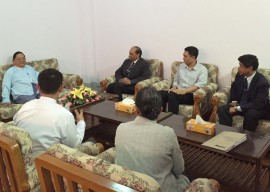
The Ministry of Construction (MOC) Myanmar is actively looking for suitable technologies to address the increasing need for affordable housing in the cities particularly Yangon, Nay Pyi Taw, and Mandalay.
On 17 February 2015 a seminar was arranged in Nay Pyi Taw for high-level government officials, contractors, and other professionals working for the Department of Human Settlement and Housing Development (DHSHD), Ministry of Construction (MOC) to discuss some of the key challenges that are being faced in constructing low-cost housing today.
Prior to the seminar, a delegation from DHSHD attended a workshop on Technology Solutions for Low-cost Housing organized by the Asian Institute of Technology (AIT) through AIT Consulting (AITC) and Habitech in November 2014 in Thailand.
Keynote speaker Dr. Naveed Anwar, Executive Director, AIT Consulting, presented three topics: an overview of housing needs, low-cost housing concepts and modules; and low-cost housing constructions technologies. Two other speakers Engr. Gyanendra Sthapit, Director, Habitech Center focused on the Habitech building system while Mr. Saw Htwe Zaw, Managing Director, S&A Co. Ltd and AITC Associate in Myanmar provided an overview of Habitech building projects in Myanmar.
During the break, the AITC team met with the senior officials from DHSHD MOC to discuss further how AITC can provide technology support in housing projects in Myanmar through innovative Habitech building technology which is not only cost-effective but also sustainable, green, and disaster-resilient. Habitech Center, AIT has done several school building projects in Myanmar in partnerships with several organizations such as Oxfam-Novib, Melta Foundation, and UNICEF Myanmar.
After the seminar, a meeting was arranged between AITC team and H.E. Dr. Win Myint, Deputy Minister, MOC to discuss the continuation of hybrid professional development program for advance level in structural design of tall buildings and long-span bridges.
In 2013, MOC engaged the services of AITC to provide professional development for engineers working in tall building and bridges. The Hybrid professional development program combines online training, classroom interaction, hands-on training, and on job training that will enable the participants to have an enriched learning experience.

